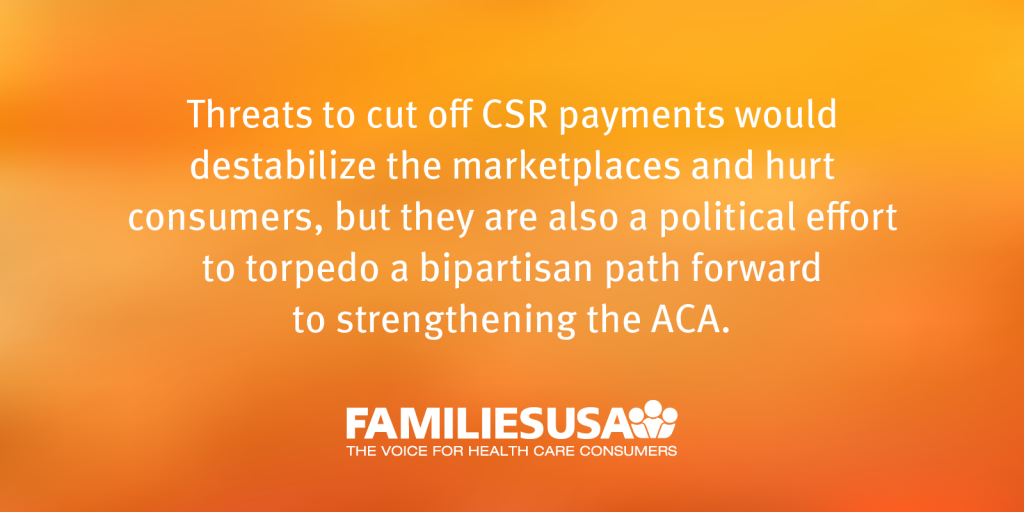
Trump’s Threats to Stop Cost-Sharing Reduction Payments Will Hurt Families
08.03.2017
Coming off the Senate failure to repeal the Affordable Care Act (ACA) last week, President Trump has threatened an immediate cutoff of payments to insurance companies that support the reductions in the amount lower-income people must pay out of their own pockets for their marketplace plans. The president threatened to stop these cost-sharing reduction (“CSR”) payments both personally via Twitter and through multiple administration representatives.
While these threats would destabilize the marketplaces and hurt consumers, they are also a political effort to torpedo a bipartisan and constructive path forward to strengthen the ACA.
A federal court ruling earlier this week significantly weakens the Trump administration’s leverage, finding that the administration cannot unilaterally stop CSR payments. This court action buys time for bipartisan efforts to guarantee these payments.
Insurers do not make any profit from cost-sharing reduction payments
CSR payments go toward reducing out-of-pocket costs for nearly 6 million lower-income people. The government has always been obligated to pay for this assistance under the ACA and does so by reimbursing insurers for lowering deductibles and other out-of-pocket costs for working families.
A case before the U.S. Circuit Court of Appeals for the District of Columbia challenges the legal basis of the CSR payments. This suit was filed by Republican members of the House of Representatives in 2014. It charges that the Obama administration lacked authority to pay for cost-sharing reductions (also called cost-sharing subsidies) – even though CSRs are an explicit part of the law. This suit was a part of the Republican Congress’s broader efforts to sabotage the ACA’s implementation.
Over the last several months, President Trump has repeatedly threatened to surrender to this suit and to cut off CSR payments. These threats intensified over the last several days.

The administration’s refusal to guarantee CSR payments destabilizes the marketplaces
Although the president and others have spun these payments as benefiting insurers, insurers do not profit a dime from these payments. Families, not insurers, are hurt if these payments are not made. Insurers, actuaries, providers, governors, and health care experts have all been outspoken that long-term, guaranteed funding of CSRs is the number one action needed to ensure the future stability of the marketplaces.
Without a guarantee that these payments will be made, premiums will rise sharply for marketplace coverage. The Kaiser Family Foundation estimates that premiums would have to increase, on average, 19 percent, and actuaries have forecasted that many insurers could pull out of the marketplace entirely.
Trump is trying to crush bipartisan efforts to guarantee CSRs
The last several days have seen encouraging signs of movement toward constructive, bipartisan market stabilization legislation in both houses of Congress. CSR payments are critical to any short-term market stabilization effort, and Republicans in both the Houseand the Senate moving forward on stabilization legislation have strongly supported new legislative language that would clarify any legal ambiguities around CSRs and make the lawsuit moot.
Trump’s CSR threats are intended to undermine such bipartisan legislation and could lead to his vetoing it. They are part of his broader effort to make the ACA fail, an effort now squarely directed at bipartisan cooperation in Congress.
The courts intervene—a positive development
On Tuesday afternoon, the D.C. Circuit Court ruled that, in the event the Trump administration abandons the CSR lawsuit, state attorneys general have standing to separately continue to defend CSRs.
This is a major reversal for the Trump administration: It means that the administration cannot unilaterally kill the CSR legal defense, and further that if they decided to simply cut off CSR payments that states would have legal standing to sue for their continuation.
But with Congress possibly moving to guarantee CSR payments—a move which would make the lawsuit irrelevant—and with marketplace plans finalizing their geographic coverage and rates for 2018, the most important implication of this court decision is that it buys time.
Both Congress and health plans alike know that it is much less likely that Trump can quickly and unilaterally withdraw CSR payments. That is a major victory for the families who depend on marketplace coverage.
